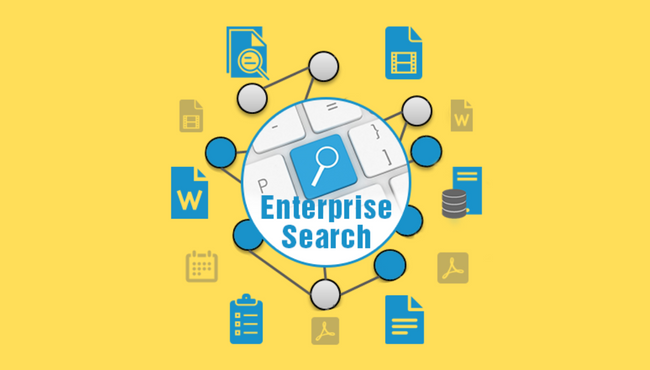
Enterprise search refers to the process of identifying content across an enterprise database. It enables authorized users in a system to access information from a vast pool of data sources within an organization.
With different data sources available, organizations with more data need enterprise search to gain quick access to the most relevant information.
Search as a function should be designed to make information easy to locate. Enterprise search sources data from document storage systems, email, and other internal databases.
Different organizational departments rely on data availability and findability to handle routine tasks. Enterprise search ensures that content is made available in the shortest time possible to inform decision-making.
Knowledge Management and Enterprise Search
Knowledge management is the core of an organization’s information system. It collectively refers to all the practices of creating, organizing, and defining the access parameters of an organization’s data.
Knowledge management ensures information is available to the people who need it to fulfill specific tasks. It also houses the knowledge that senior-level employees can share with other staff.
Knowledge Management improves the effectiveness of an organization by structuring and appraising knowledge.
Knowledge Management Process
We can visualize the enterprise search process in three main stages:
1. Creation
Knowledge creation means the accumulation of information from different sources. Organizations document and store vital information to guide their core processes.
Knowledge is acquired from various sources, including client communications, manuals, handbooks, and intellectual property. Knowledge creation also implies the consolidation of product designs and service guidelines.
2. Organization
It is crucial for organizations to identify and categorize all these information sources to facilitate easy future reference. After knowledge creation, knowledge managers organize the data.
Knowledge organization involves defining repositories and assigning information to these categories. Information that is well organized enables users to define filters in enterprise search systems.
3. Sharing
Knowledge sharing is the final step of enterprise search. At this stage, an organization defines user authorization for different data sets.
Users can access the knowledge database to find different types of information on-demand. Security measures should be integrated to prevent unauthorized access to the database.
- Enterprise Search Platform: Connectors, semantic and linguistic analysis support it. These platforms utilize the applications of AI and machine learning to recognize search terms and provide fast results from an extensive database.
- Customer Service: Customers need access to swift responses. A reliable knowledge platform should provide accurate feedback on demand. Customers can find product information and access more information on specific services.
- Classifying Sensitive Information: Knowledge management software also categorizes and stores sensitive data. Knowledge managers have access to sensitive information, which should always be protected.
- Investigation Intelligence: Knowledge managers and security analysts use knowledge systems to diagnose and audit information systems. They can identify potential threats in the existing framework to avert breaches before they happen.
Benefits of Enterprise Search
Organizations can reap a lot of benefits from knowledge management. Many organizations go through the arduous process of finding information in individual applications. Not only does this waste a lot of time, but it also makes the search process very difficult.
Below the benefits of enterprise Search:
1. It streamlines decision-making
Employees can access a company’s knowledge system to improve the quality of their decisions. Knowledge systems enable access to critical information based on the documented past. Knowledge managers can also integrate AI to provide in-depth guidelines from simple search inputs.
2. Improving customer relationships
In the modern era, many businesses offer customer support online. Customers use company knowledge platforms to request, ask questions, and submit reviews. Reliable knowledge systems ensure customers get assistance when they require it.
3. Creating a culture of innovation
Information can be shared throughout the organization through knowledge management. New employees, for instance, can tap into the knowledge system to access policies and lessons from other staff.
Knowledge platforms promote sharing of information and ideas, which bolsters innovation through collaboration.
4. Increasing productivity
Employees can do more by creating a simple and effective internal search engine. Using knowledge management, you can automate repetitive tasks. This gets the job done faster by eliminating redundant activities.
5. Security of information
It is easier to monitor data from a central knowledge center. You can define permissions and specify authorization parameters in a knowledge management system.
6. Reusing past lessons
Employees can reuse past problem-solving techniques to approach new challenges. Enterprise Search creates a smoother workflow and guides decision-making which can be applied in many different situations.
Conclusion
Knowledge is power. Organizations have multiple sources of information at any given time. To use this information in the best way, it is crucial to have a structured organization through knowledge management.
As more businesses generate more information, they can use knowledge platforms to keep track of changes in their pool of information. Proper information management is the key to understanding a business and its core units.
